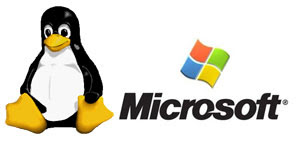Fire up the FUD machine
 Microsoft’s strategy for dealing with open source software – not just Linux, but focused on Linux – is becoming clear: Litigate, not innovate. Or, as I would contend, threaten to litigate, but don’t actually litigate.
Microsoft’s strategy for dealing with open source software – not just Linux, but focused on Linux – is becoming clear: Litigate, not innovate. Or, as I would contend, threaten to litigate, but don’t actually litigate.
Frankly, I doubt that Microsoft is going to begin broad lawsuits to protect the 235 patents that Steve Ballmer claims, in a Fortune interview this month, that open source software violates. I doubt that it’s going to start suing open source companies, or even begin suing large corporate users of its software.
Instead, Microsoft is spreading fear, uncertainty and doubt, hoping to make software companies and corporate customers think that open source is legally risky… and that Microsoft software, though expensive, often riddled with security flaws, and intentionally designed to be non-interoperable with competitive products and platforms, is legally safe.
That’s a shame, because Microsoft seems to think that customers are choosing open source software because it’s cheaper. Often, however, they’re choosing open source software because it’s better.
The value of open source software isn’t just that it’s “free.” Often, the “free” part doesn’t come into the equation. As Microsoft and other companies have repeatedly shown, the most important proposition when it comes to enterprise software is TCO, or total cost of ownership.
For a consumer or enthusiast, who likes to play with open source software, open source has a great value proposition. For large enterprises, who can afford to devote resources to learning how to manage open source software, it’s also a great value proposition. For smaller and mid-sized companies, who can’t justify the time/cost to become experts, the TCO is more mixed, and often, products like those from Microsoft are the better value.
That’s why, I believe, very small companies and huge companies gravitate to open source software, while smaller shops, especially those for whom software and computers aren’t part of their core competency, prefer canned commercial offerings such as those from Microsoft or Apple.
That doesn’t just apply to the question of Windows vs. Mac OS X vs. Linux, but encompasses projects like OpenOffice, SugarCRM and others. The integration and support costs of open source can sometimes overwhelm the “free” part of the value proposition.
So why choose open source software? Because the companies and projects that make open source software typically don’t have ulterior motives beyond creating great software. The team behind OpenOffice has no vested interest in pushing Windows, or Mac, or Linux, or Solaris. So, they try hard to make sure that OpenOffice works fine everywhere. The team behind Microsoft Office does have a vested interest in Windows Everywhere, which is why we don’t have Microsoft Office for Linux, and why Microsoft Office for Mac is always half-a-step behind Microsoft Office for Windows.
Microsoft’s strategy for dealing with the push-back against Windows Vista, Office 2007 and some of its other products should be to innovate: Make sure that your products are the ones that customers would prefer to use. Instead, it’s pursuing a strategy where customers don’t really want to use their products, but are afraid not to.
Long-term, that’s not a recipe for success. Microsoft has tried to lock people in with proprietary file formats (how many people use Microsoft Office because they have to work with people who use Microsoft Office?), proprietary protocols (they love when Web sites are optimized for Internet Explorer 7), and now, proprietary intellectual property.
Don’t innovate. Threaten to litigate.
This is very reminiscent of SCO’s attempts to use FUD to attack open source software. The lawsuits against IBM, Novell, AutoZone and Daimler Chrysler have not yet been successful, and it looks like they’ll never be successful, as SCO was playing a weak hand and didn’t have much money to place bets.
Microsoft probably has a stronger hand than SCO, and it certainly has deeper pockets. Ballmer’s claims about 235 patents sounds stronger than SCO’s claims about copied source code. Microsoft has tremendous amounts of money to use to not only pursue its legal options, but to market its FUD. Also, Bill Gates and Steve Ballmer are unquestionably smart, while Darl McBride seems to be an idiot.
Even so, it all comes down to Microsoft’s being unable to say, “Use our software because it’s better,” but instead saying “Don’t use open source software otherwise we’ll sue you.”
One of the more thoughtful comments to the Microsoft story is from Sun CEO Jonathan Schwartz, who advises Ballmer, “You would be wise to listen to the customers you’re threatening to sue – they can leave you, especially if you give them motivation. Remember, they wouldn’t be motivated unless your products were somehow missing the mark.”
